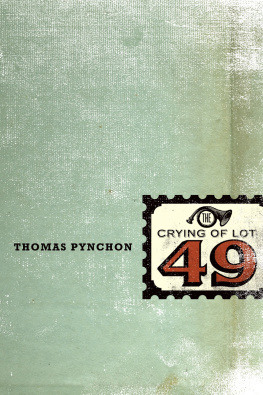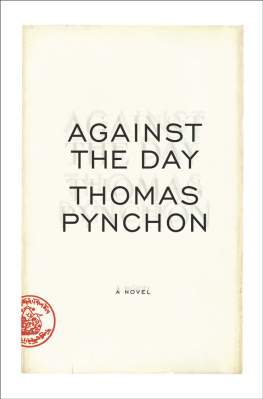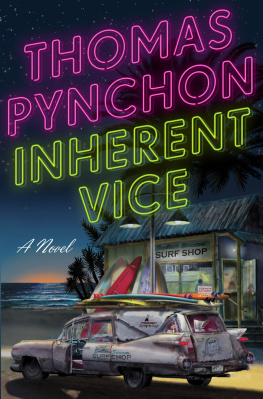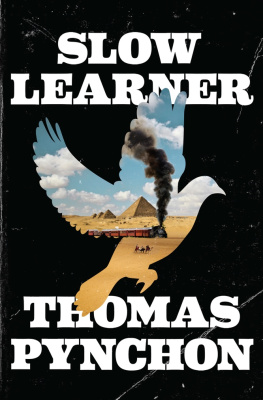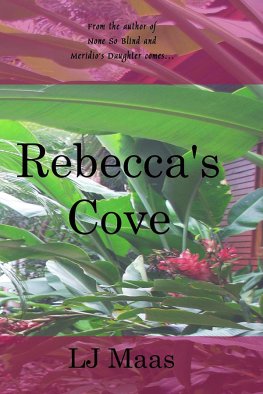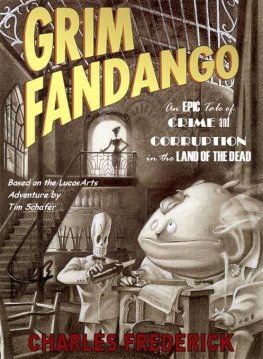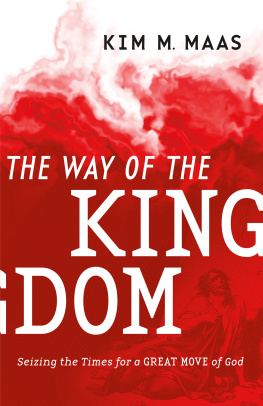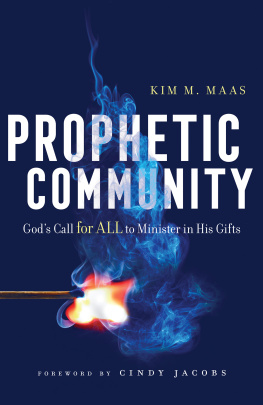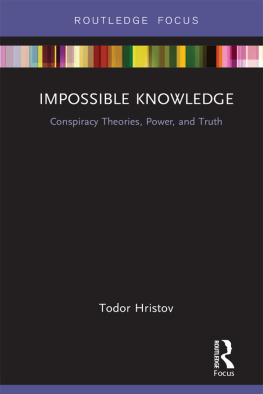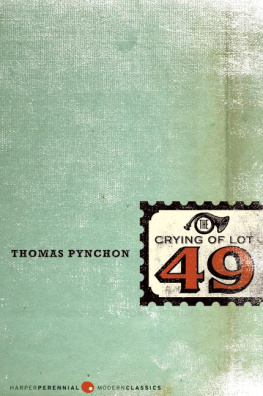Contents
Thomas Pynchon
The Crying of Lot 49
The Penguin Press
New York
2012
THE PENGUIN PRESS
Published by the Penguin Group
Penguin Group (USA) Inc., 375 Hudson Street,
New York, New York 10014, U.S.A.
Penguin Group (Canada), 90 Eglinton Avenue East, Suite 700,
Toronto, Ontario, Canada M4P 2Y3
(a division of Pearson Penguin Canada Inc.)
Penguin Books Ltd, 80 Strand, London WC2R 0RL, England
Penguin Ireland, 25 St. Stephens Green, Dublin 2, Ireland
(a division of Penguin Books Ltd)
Penguin Books Australia Ltd, 250 Camberwell Road, Camberwell,
Victoria 3124, Australia
(a division of Pearson Australia Group Pty Ltd)
Penguin Books India Pvt Ltd, 11 Community Centre, Panchsheel Park,
New Delhi 110 017, India
Penguin Group (NZ), 67 Apollo Drive, Rosedale, Auckland 0632,
New Zealand (a division of Pearson New Zealand Ltd)
Penguin Books (South Africa) (Pty) Ltd, 24 Sturdee Avenue,
Rosebank, Johannesburg 2196, South Africa
Penguin Books Ltd, Registered Offices:
80 Strand, London WC2R 0RL, England
This edition published in 2012 by The Penguin Press,
a member of Penguin Group (USA) Inc.
Copyright Thomas Pynchon, 1965, 1966
All rights reserved
Originally published by J. B. Lippincott Company, 1965.
A portion of this novel was first published in Esquire Magazine under the title The World (This One), the Flesh (Mrs. Oedipa Maas), and the Testament of Pierce Inverarity. Another portion appeared in Cavalier.
Publishers Note
This is a work of fiction. Names, characters, places, and incidents either are the product of the authors imagination or are used fictitiously, and any resemblance to actual persons, living or dead, business establishments, events, or locales is entirely coincidental.
ISBN 978-1-101-59460-5
No part of this book may be reproduced, scanned, or distributed in any printed or electronic form without permission. Please do not participate in or encourage piracy of copyrighted materials in violation of the authors rights. Purchase only authorized editions.

One summer afternoon Mrs Oedipa Maas came home from a Tupper-ware party whose hostess had put perhaps too much kirsch in the fondue to find that she, Oedipa, had been named executor, or she supposed executrix, of the estate of one Pierce Inverarity, a California real estate mogul who had once lost two million dollars in his spare time but still had assets numerous and tangled enough to make the job of sorting it all out more than honorary. Oedipa stood in the living room, stared at by the greenish dead eye of the TV tube, spoke the name of God, tried to feel as drunk as possible. But this did not work. She thought of a hotel room in Mazatln whose door had just been slammed, it seemed forever, waking up two hundred birds down in the lobby; a sunrise over the library slope at Cornell University that nobody out on it had seen because the slope faces west; a dry, disconsolate tune from the fourth movement of the Bartk Concerto for Orchestra; a whitewashed bust of Jay Gould that Pierce kept over the bed on a shelf so narrow for it shed always had the hovering fear it would someday topple on them. Was that how hed died, she wondered, among dreams, crushed by the only ikon in the house? That only made her laugh, out loud and helpless: Youre so sick, Oedipa, she told herself, or the room, which knew.
The letter was from the law firm of Warpe, Wistfull, Kubitschek and McMingus, of Los Angeles, and signed by somebody named Metzger. It said Pierce had died back in the spring, and theyd only just now found the will. Metzger was to act as co-executor and special counsel in the event of any involved litigation. Oedipa had been named also to execute the will in a codicil dated a year ago. She tried to think back to whether anything unusual had happened around then. Through the rest of the afternoon, through her trip to the market in downtown Kinneret-Among-The-Pines to buy ricotta and listen to the Muzak (today she came through the bead-curtained entrance around bar 4 of the Fort Wayne Settecento Ensembles variorum recording of the Vivaldi Kazoo Concerto, Boyd Beaver, soloist); then through the sunned gathering of her marjoram and sweet basil from the herb garden, reading of book reviews in the latest Scientific American, into the layering of a lasagna, garlicking of a bread, tearing up of romaine leaves, eventually, oven on, into the mixing of the twilights whiskey sours against the arrival of her husband, Wendell (Mucho) Maas from work, she wondered, wondered, shuffling back through a fat deckful of days which seemed (wouldnt she be first to admit it?) more or less identical, or all pointing the same way subtly like a conjurers deck, any odd one readily clear to a trained eye. It took her till the middle of Huntley and Brinkley to remember that last year at three or so one morning there had come this long-distance call, from where she would never know (unless now hed left a diary) by a voice beginning in heavy Slavic tones as second secretary at the Transylvanian Consulate, looking for an escaped bat; modulated to comic-Negro, then on into hostile Pachuco dialect, full of chingas and maricones; then a Gestapo officer asking her in shrieks did she have relatives in Germany and finally his Lamont Cranston voice, the one hed talked in all the way down to Mazatln. Pierce, please, shed managed to get in, I thought we had
But Margo, earnestly, Ive just come from Commissioner Weston, and that old man in the fun house was murdered by the same blowgun that killed Professor Quackenbush, or something.
For Gods sake, she said. Mucho had rolled over and was looking at her.
Why dont you hang up on him, Mucho suggested, sensibly.
I heard that, Pierce said. I think its time Wendell Maas had a little visit from The Shadow. Silence, positive and thorough, fell. So it was the last of his voices she ever heard. Lamont Cranston. That phone line could have pointed any direction, been any length. Its quiet ambiguity shifted over, in the months after the call, to what had been revived: memories of his face, body, things hed given her, things she had now and then pretended not tove heard him say. It took him over, and to the verge of being forgotten. The shadow waited a year before visiting. But now there was Metzgers letter. Had Pierce called last year then to tell her about this codicil? Or had he decided on it later, somehow because of her annoyance and Muchos indifference? She felt exposed, finessed, put down. She had never executed a will in her life, didnt know where to begin, didnt know how to tell the law firm in L. A. that she didnt know where to begin.
Mucho, baby, she cried, in an access of helplessness.
Mucho Maas, home, bounded through the screen door. Today was another defeat, he began.
Let me tell you, she also began. But let Mucho go first.
He was a disk jockey who worked further along the Peninsula and suffered regular crises of conscience about his profession. I dont believe in any of it, Oed, he could usually get out. I try, I truly cant, way down there, further down perhaps than she could reach, so that such times often brought her near panic. It might have been the sight of her so about to lose control that seemed to bring him back up.
Youre too sensitive. Yeah, there was so much else she ought to be saying also, but this was what came out. It was true, anyway. For a couple years hed been a used car salesman and so hyperaware of what

